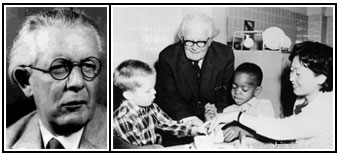Genetic Epistemology “Play is the answer to how anything new comes about” Jean Piaget Genetic epistemology is a study of the origins of knowledge or the developmental theory of knowledge. The discipline was established by the Swiss developmental psychologist and philosopher Jean Piaget (1896-1980). Piaget was known for his epistemological studies with children and his theories of cognitive development. The goal of genetic epistemology is to link the validity of knowledge to the model of its construction. It shows that how the knowledge was gained affects how valid it is. For example, our experience of gravity makes our knowledge of it more valid than our theory about black holes. Genetic epistemology also explains the process of how people
develop cognitively from birth throughout their lives in four primary stages: 2)
Preoperational 3) Concrete Operational
Awareness (Conop) 4) Formal Operational
Awareness (Formop)
|
